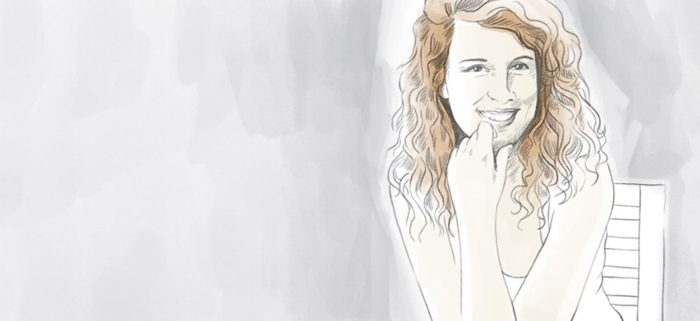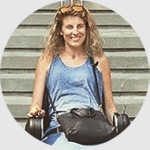Doctoral candidate Stephanie Chipeur was recently interviewed by Béatrice Média to talk about the challenges of being a disabled woman in Montreal.
Text by Adriana Palanca. Illustration by Mireille St-Pierre.
Beatrice
Please introduce yourself !
SC
My name is Stephanie Chipeur, I’m 31 years old and I’m doing my PhD in law at McGill University. I did my Master’s there as well, but the day before my Master’s thesis was due, I was in a car accident in New Brunswick. We hit a moose and it broke my neck at C5, which is the level considered to be quadriplegic. I spent a couple of months in Moncton and another year hospitalized in Calgary, where my family lives. I moved back here to do my PhD, but when I did, with my wheelchair, the things I had loved about this city were no longer. I still loved Montreal, but it had become an unwelcoming place for me. Then when I started work on my PhD project again, I quickly realized that I didn’t want to write about the topic I had been interested in before.
B
Which was?
SC
I had been writing about the cost of legal services as a huge barrier to people accessing the justice system, but I couldn’t really focus on that any longer. I became fascinated by disability, politics and the most obvious thing that was affecting my life, not being able to go anywhere. So I decided to take on the issue of building codes in Canada and specifically, in Montreal, and write about that as a human rights problem in our country. Access to public space is really political and the way that Montreal is set up is based on the idea that only certain bodies are part of political and civic society and that the rest, people like myself, can’t participate.
B
So if you can’t participate fully in society, then is also becomes a human rights issue…
SC
That’s my argument. The systems that we have are not working, because public buildings are simply not accessible. There has to be another way. In my thesis, I talk about other forms of policing, like the way that restaurants are checked for health violations. The burden has to be, I think, on the municipality and on the province to inspect buildings and ensure access, especially for basic places like schools, hospitals and polling stations. If I can vote and go to school, but I can’t access anywhere else in society, what does that say about my dignity or my ability to participate in the world? It’s obviously a really personal topic, but I think I’m in the right position to speak to it, since there are not a lot of disabled academics in Canada and especially not at McGill.
B
Is the disabled community able to mobilize and get certain actions moving? Or are there obstacles to that happening?
SC
There are a number of obstacles. First of all, the lives of people with disabilities, especially as severe as mine, require a large amount of organization. It can take a lot just to plan your everyday life, including care and public transportation, so adding political activism is hard. Second, there are a lot of people who are vulnerable, in terms of their health, so it can be difficult for them to march, roll down the street in their wheelchair or even just take the Metro—there are no washrooms down there and it could be a threat to your health if you’re suddenly stuck and can’t get out. There’s a privilege that we don’t recognize in political activism. People who are activists and fight for their issues have the time and health to make their statements, march in protests, organize themselves. That’s not always possible for people with disabilities.
Also, there’s a range of disabilities and so it’s hard to rally around a specific cause. We all have different issues and there are conflicting interests. For example, someone who’s blind may want different textures on the road at intersections, but those bumps are actually bothersome in a wheelchair. I can’t think of one single issue that all disabilities suffer from, other than general accessibility, but concretely, most issues are related to different types of disabilities.
B
Are there additional challenges to being a woman and disabled?
SC
Well, on a very concrete level, women’s bodies are not set up to have upper body strength. I worked really hard in rehab, but it’s going to take me a lot longer to build the upper body muscle I need to do things like transfer myself from my wheelchair to another surface, to dress myself. Look at my legs, they’re still meaty. I still have a bum, I still have hips, but many men I know in wheelchairs are so skinny below the waist. Physically, I need a lot more help from careworkers. Guys I met in rehab or that have been injured for years, are way ahead of me in terms of independence, because they have an advantage physically.
Second, as a woman, it doesn’t hurt my dignity to need care, in the way that a lot of men I meet are motivated to be independent and able to do things for themselves. In that sense, I’m lucky because I don’t mind being someone who requires care. Also, there are actually politics to the kind of wheelchair you use. So many men I know who are quadriplegic want to use a manual wheelchair to show that they’re physically independent. When I go to wheelchair rugby, they push me, “we’re going to get you out of your power chair”. But I actually love my chair. I don’t need to bulk up my arms. That doesn’t matter to me. But for men, it’s an identity issue.
B
A topic of conversation that comes up a lot when we talk to women about their experience is labels. What is your relationship to the labels used to define you?
SC
When I was first in the hospital in Moncton, in those first couple of weeks, it had such a negative connotation to have someone say to me, “you’re a quadriplegic”. It was scary. But as time evolved, and I met people and learned about wheelchair sport, I started to develop pride in that and not reject the label. Now I’m very much drawn to and identify with this idea of crip theory (crip like cripple). It’s like queer theory, since our bodies are not considered to be “normal”, we challenge the very basis of society by simply existing. I know other people who like to say things like, “I’m an atypical body”, but I’m okay with the word disabled.
In the News
|
B
Is there some part of your experience that you would like others to be aware of?
SC
Two things. One, you don’t know how many times people come up to me and have their own little grief party over my situation. Mostly men. They’re like, “you’re just so beautiful and I can’t believe this happened”. And my reaction is, why don’t you do that by yourself? I don’t need to go through that with you just because you saw me and decided to talk me. It doesn’t make me feel good to hear how sad you are for me. There’s no need and it’s very insensitive.
Also, I think that if people had any clue of how limited I am or excluded I am, from pretty much everywhere, I think they would be shocked. For example, with such cold temperatures, we all hibernate in winter here in Montreal, but people with disabilities even more so, because it’s scary not to know when you’ll next find a warm place or a bathroom. It all comes down to visibility. People really underestimate the number of disabled people who are experiencing these issues. Because so many public spaces are inaccessible to wheelchair users, people don’t see us as much and if you’re not visible, then there’s no way for people to empathize with and understand your experience.
THE BEATRICE QUESTIONNAIRE
1. What is your idea of happiness?
Being with friends
2. What is your greatest strength?
My stubbornness
3. What do you consider your greatest achievement?
Returning to life after my injury
4. What is your most treasured possession?
My wheelchair
5. Who is your hero?
My sister, who has been insanely there for me since the accident


